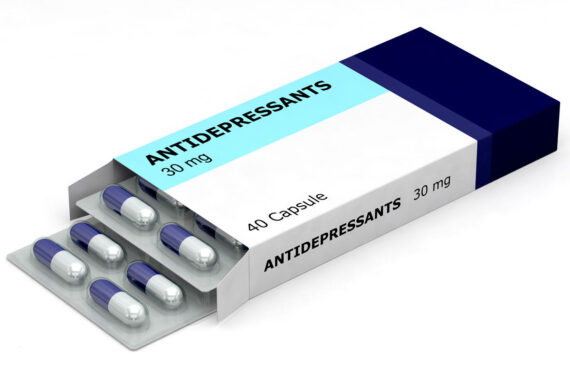Antidepressants in pregnancy not linked to autism, finds large study

Antidepressant use in pregnancy does not in itself increase the risk of neurodevelopmental disorders such as autism in children, a large study has found.
But women using antidepressants during pregnancy did have a higher risk of having a child with a neurodevelopmental disorder than individuals not using antidepressants, suggesting factors other than the medication may be involved.
Previous studies that have looked at this issue, most of which have focused on autism and attention deficit hyperactivity disorder (ADHD) have produced conflicting results and the issue remains controversial, the researchers reported in JAMA Internal Medicine.
A team at Harvard Medical School looked at 3.2 million pregnancies across two large health insurance databases with children followed for up to 14 years.
The crude results from 145,702 pregnancies with antidepressant exposure and more than 3 million unexposed pregnancies showed a doubling in risk of a range of neurodevelopmental outcomes.
But once the team had adjusted the analyses for an ‘extensive list’ of potential confounding factors this association began to drop away, they reported.
Overall individuals exposed to antidepressants were older and had greater medication use during pregnancy than unexposed individuals and in one of the databases, antidepressant- exposed individuals were also more likely to be white.
Careful comparisons with women who had discontinued antidepressants before pregnancy further shifted the risk towards zero and when they looked at exposed and non-exposed siblings there was no increased risk of antidepressant use.
Autism has been the most studied neurodevelopmental disorder related to antidepressants in pregnancy with some reports of 20-80% increased risk.
But after adjusting the findings for a broad range of factors, there was no association in their analysis, the researchers said.
Yet the crude association they found suggests that antidepressant use during pregnancy may be a ‘robust marker’ for neurodevelopmental risk in children and could be useful for early screening and intervention in children.
Professor Carmine Pariante, professor of biological psychiatry at the Institute of Psychiatry, Psychology and Neuroscience, King’s College London, said this was ‘truly an important paper’.
‘Women and health professionals are often concerned about antidepressants in pregnancy, and sometimes decide to suddenly stop these medications as soon as pregnancy becomes known.
‘What this study shows is that, in reality, previous concerns that antidepressant use increases the risk of autism or other neurodevelopmental disorders are due to the effects of depression itself, or to risk factors for depression, and not to antidepressants.
‘Women with clinically significant depression, or other mental disorders where antidepressants are indicated, should be informed that the risk associated with antidepressants use in pregnancy is not as high as previously thought, and should be offered the possibility to discuss this therapeutic option as part of a package of care that should include also psychological and social support.’
Current NICE guidance on antidepressants in pregnancy
Before discussing the benefits and harms of treatment, or starting, stopping or switching antidepressant treatment during pregnancy, seek advice, ideally from a specialist perinatal mental health team, where available; or from a secondary mental health service; or the UK Teratology Information Service (UKTIS) on 0344 892 0909.
- Decisions about treating depression during pregnancy should be made on an individual basis. Involve the woman, and her family where appropriate, in all decisions about treatment, taking into account information on:
- The nature of her depression and severity of symptoms.
- Any psychiatric and physical comorbidities.
- Previous history and response to treatment.
- Stage of pregnancy.
- The options available and their risk, harms and benefits.
- The woman’s relationships with, and level of support from, family or carers and the needs of her family (for example the welfare of her baby and other children).
- Discuss:
- Any particular concerns the woman has about her baby.
- Her plans regarding breastfeeding. Explain the benefits of breastfeeding and the risks associated with taking psychotropic medication when breastfeeding.
- The risks or harms to the woman or fetus of stopping antidepressants abruptly or changing treatment.
- The risks associated with not treating depression during pregnancy.
- The risks associated with any pregnancy:
- Miscarriage or birth defect can occur in any pregnancy even if medication has not been taken.
- The risk of miscarriage in pregnancy is about 10 to 20 out of every 100 pregnancies.
- The risk of birth defect is about 1 in 40 pregnancies.
- The treatment options available to the woman (including psychological treatment, antidepressant treatment, or a combination of psychological and antidepressant treatment), including:
- The higher threshold for pharmacological interventions arising from the changing risk-benefit ratio for psychotropic medication at this time (also note that no psychotropic medication has a UK marketing authorisation specifically for women who are pregnant or breastfeeding) and the likely benefits of a psychological intervention.
- The potential benefits of each treatment, considering the severity of the mental health problem.
- The risks or harms to the woman and the fetus associated with each treatment option. Discuss the uncertainty about whether any increased risk to the fetus and other problems for the woman or baby can be attributed directly to these drugs or may be caused by other factors.
- Treatment options that would enable a woman to breastfeed if she wishes.
- The uncertainty about the benefits, risks and harms of treatments for mental health problems in pregnancy.
- The need for prompt treatment because of the potential effect of an untreated mental health problem on the fetus.
Source: NICE
Visit Pulse Reference for details on 140 symptoms, including easily searchable symptoms and categories, offering you a free platform to check symptoms and receive potential diagnoses during consultations.
Related Articles
READERS' COMMENTS [1]
Please note, only GPs are permitted to add comments to articles










Thank goodness. As there’s a whole lot of sertraline in the water works.